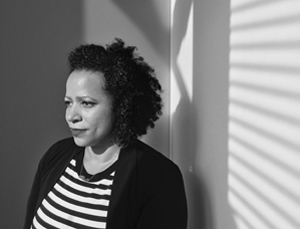 Although school boards and state legislatures mandate how to teach history and current events, as well as how to define concepts such as race, discrimination, and social justice, teachers are the ones who hold the power to contextualize, connect, and give meaning to these lessons.
Although school boards and state legislatures mandate how to teach history and current events, as well as how to define concepts such as race, discrimination, and social justice, teachers are the ones who hold the power to contextualize, connect, and give meaning to these lessons.
Where does the lesson begin and where does it end? Can we—and should we—teach students how to apply these ideas outside of the classroom?
According to Nikole Hannah-Jones, an investigative reporter covering racial injustice for The New York Times Magazine, these conversations—however difficult—are critical.
“It’s important to teach students about the real world,” says Hannah-Jones. “Not just phonics and math, but how to think, to process, to examine the larger society.”
In the United States, escalating racially motivated violence has spurred many educators to stretch the boundaries of their curricula and engage their students in inclusive conversations about their own racial identities and experiences.
At the ILA 2016 Conference & Exhibits, which took place just days after the Alton Sterling shooting in Baton Rouge, LA, and the Dallas, TX, murder of several police officers gunned down in a seemingly retaliatory effort, educator Cornelius Minor engaged attendees in an impromptu conversation to demonstrate how teachers should talk about emotionally charged and controversial topics. Minor, lead staff developer at the Teachers College Reading and Writing Project, hoped to model how many educators feel leading these conversations in the classroom: underprepared and uncomfortable.
Minor’s standing room–only session inspired ILA to add a new Current Events Panel to the 2017 Conference & Exhibits lineup. “Disrupting a Destructive Cycle: How Literacy Drives Social Change,” moderated by Hannah-Jones and emceed by Minor, will include panelists Monita K. Bell, senior editor of Teaching Tolerance; Deborah S. Delisle, executive director and CEO of the Association for Supervision and Curriculum Development; Zareen Jaffery, executive editor of Salaam Reads; Ebony Elizabeth Thomas, assistant professor in the Literacy, Culture, and International Education Division at the University of Pennsylvania’s Graduate School of Education; and Gene Luen Yang, (U.S.) National Ambassador for Young People's Literature.
After delivering a short keynote at the ILA 2017 event, Hannah-Jones will moderate a discussion that includes exploring the more expansive and evolving definition of literacy—particularly because she sees digital literacy and political literacy as key agents of civic engagement and social change.
“We have focused so much on literacy in terms of how well someone can perform on a test, but it’s also about your ability to exercise your rights as a citizen and to participate fully in democracy,” she says. “A hallmark of segregation is that it disenfranchises and allows us to ignore large swaths of communities that don’t have the political acumen to fight for their rights, and don’t understand what their rights are.”
Earlier that day, attendees can learn more about these issues at a special screening of Teach Us All, a documentary on educational inequality and the resegregation of America’s schools set against the backdrop of the 1957 Little Rock, AR, school crisis. Hannah-Jones was interviewed for the project by the film’s auteur, Sonia Lowman, and appears throughout. A brief discussion facilitated by ILA Board member Stephen Peters will follow the film.
The documentary resonates with Hannah-Jones, whose latest book, The Problem We All Live With (expected to be published in 2019), examines the history of school segregation in the United States and argues that the public school system was not designed to deliver an equal education to black students and white students.
Hannah-Jones is a firm believer in literacy as the foundation of all learning.
“From spending time in classrooms in high-poverty, racially isolated schools, I can tell you that if you don’t have a strong foundation in literacy, there’s no way you can catch up,” she says. “You can’t do well in any of your subjects if you don’t have strong literacy.”
Hannah-Jones says she hopes that educators who attend will leave with a set of tools they can use to facilitate constructive conversations and empower their students to promote social justice.
“I hope that they will gain some insights on how to think about literacy and push for the supports that their students need,” she says. “But also how to talk about these inequalities with direct language and a clear-eyed understanding of what the problems are and the solutions should be.”
She encourages those planning to attend the panel to prepare themselves by practicing introspection and reflecting on the stereotypes that inform their own biases.
“Teachers first have to deal with addressing biases and racial anxieties they may have themselves,” Hannah-Jones says. “It’s important to teach students to be tolerant, but that’s difficult to do if the teachers themselves [hold biases].”
To learn more about the Current Events Panel, visit the ILA 2017 Conference & Exhibits app.
Alina O’Donnell is the editor of Literacy Daily.